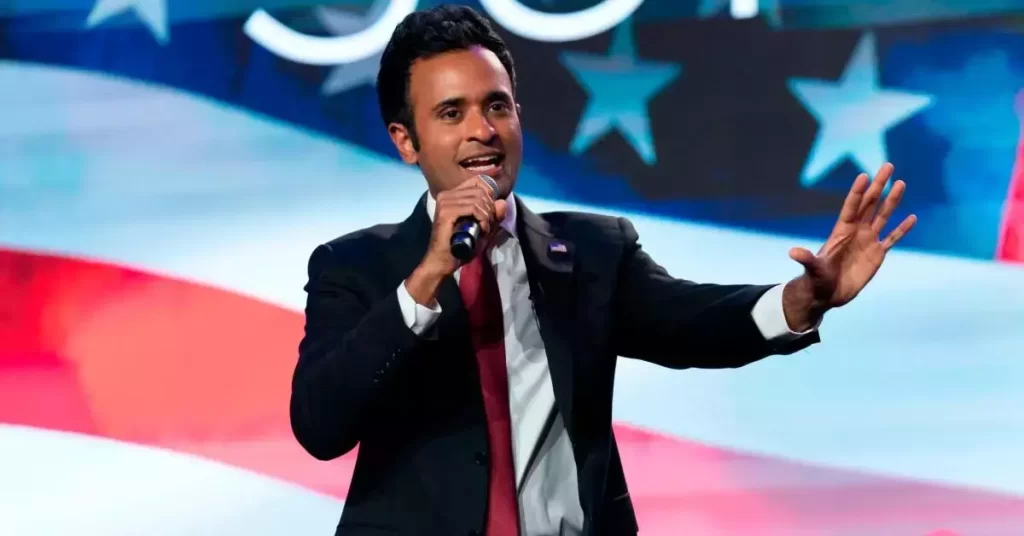GOP Candidate Vivek Ramaswamy’s Bold Vision for America’s Future Unveiled in New Hampshire Town Hall
In the heart of New Hampshire, under the bright lights of Exeter’s town hall, Vivek Ramaswamy, an unassuming but passionate figure, took the stage. In the hushed anticipation of the audience, he unveiled a vision for America that was as bold as it was controversial, as audacious as it was intricate.
At the core of Ramaswamy’s message was a profound belief in the resilience of the American spirit. Drawing an analogy that resonated deeply with his listeners, he likened the nation’s struggles to the challenges faced by a teenager undergoing the tumultuous journey of self-discovery. In this metaphorical landscape, America wasn’t in decline; it was simply experiencing the growing pains of adolescence. This perspective injected a sense of hope into his narrative, reframing the discourse from despair to one of transformative potential.
Ramaswamy’s policy proposals, delivered with a fervor that bordered on evangelical, were nothing short of revolutionary. He called for a complete overhaul of the educational system, advocating for the dismantling of major federal agencies, including the Department of Education. With conviction in his voice, he argued that education decisions should rest firmly in the hands of parents, a stance that resonated strongly with advocates of parental choice. His promise to channel the department’s considerable funding, a staggering $80 billion, back to the taxpayers was met with a mix of awe and skepticism, underscoring the audacity of his vision.
Economic policy, too, fell under Ramaswamy’s scrutinizing gaze. Rejecting the status quo of incremental budget reforms, he championed the concept of zero-based budgeting. This method, which involved a meticulous reevaluation of federal expenditures from a baseline of zero, challenged the very foundations of budgetary decision-making. Ramaswamy argued that this approach would strip away the bureaucratic bloat, leading to a leaner, more efficient government apparatus. While critics dismissed it as impractical, supporters saw it as a daring departure from convention, a testament to Ramaswamy’s unyielding commitment to fiscal responsibility.
On the international stage, Ramaswamy’s approach was as pragmatic as it was strategic. His defense of Israel’s right to protect itself was unwavering, but he tempered his stance with a keen awareness of America’s interests. In a world where alliances shifted like sand dunes, he advocated for nuanced diplomacy, emphasizing the need to protect American interests above all else. His approach to Russia, often viewed with suspicion by many Americans, was characterized by cautious optimism. He acknowledged the complexities of dealing with a resurgent Russia but saw an opportunity in reopening diplomatic channels. This, he believed, could pave the way for a more stable global order, one where America’s interests were safeguarded without unnecessary antagonism.
However, Ramaswamy’s vision was not without its detractors. Within his own party, voices of dissent grew louder. Nikki Haley, a formidable Republican figure, openly challenged his foreign policy stances during a heated debate. She voiced concerns that his proposals, if implemented, might compromise American security, triggering a fierce debate within the Republican ranks. This internal strife highlighted the depth of division within the party, a schism between traditionalists and those daring enough to envision a radically different America.
As the dust settled in Exeter’s town hall and the echoes of Ramaswamy’s speech lingered in the air, one thing became abundantly clear: the political landscape had shifted. A new narrative had been woven into the fabric of American politics, one that challenged convention and dared to dream of a different future. Whether Ramaswamy’s vision would be embraced or rejected remained uncertain, but one undeniable truth emerged from that historic night – Vivek Ramaswamy had sparked a conversation that would resonate far beyond the borders of New Hampshire, a conversation about the very essence of American identity and the path the nation would tread in the uncertain years ahead.



